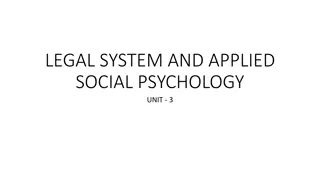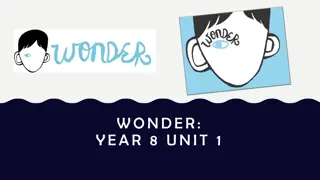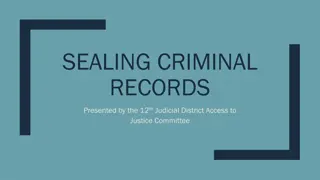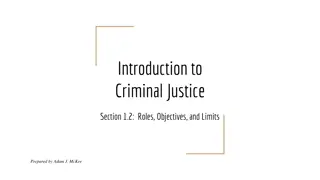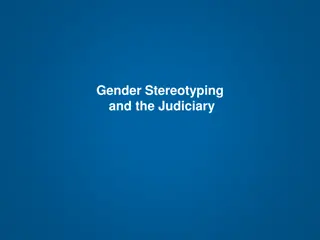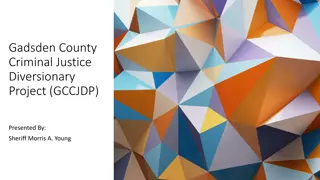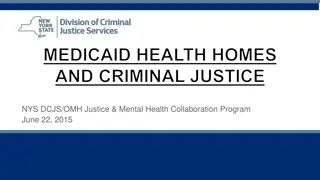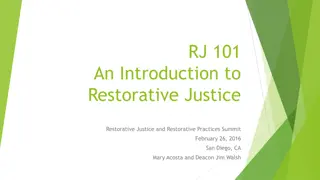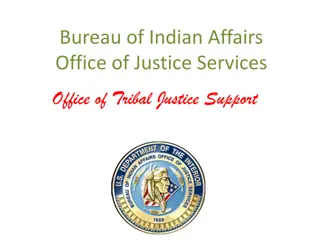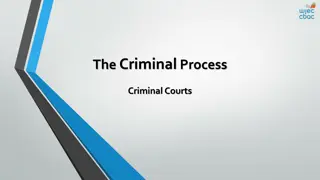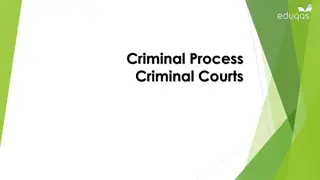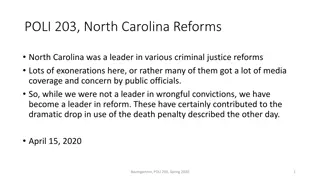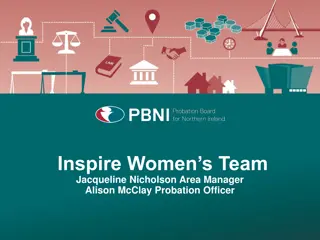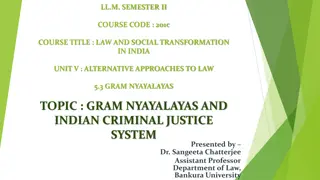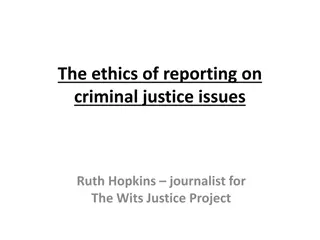Supporting Women in the Criminal Justice System: The Miranda Project
The Community Restorative Centre (CRC) and its Miranda Project provide specialized support to individuals impacted by the criminal justice system, with a focus on post-release programs. The Miranda Project works with women at risk of domestic violence, emphasizing diversion from the criminal justice system and acknowledging the overrepresentation of Indigenous women in custody. Originating from the Women's Advisory Council, the project utilizes a long-term relational outreach model to address social determinants of criminalization.
Download Presentation

Please find below an Image/Link to download the presentation.
The content on the website is provided AS IS for your information and personal use only. It may not be sold, licensed, or shared on other websites without obtaining consent from the author. Download presentation by click this link. If you encounter any issues during the download, it is possible that the publisher has removed the file from their server.
E N D
Presentation Transcript
The Community Restorative Centre acknowledges and pays respect to the traditional custodians of the land on which our offices stand, Elders past and present, and all Aboriginal and Torres Strait Islander peoples within these boundaries. Miranda Project
COMMUNITY RESTORATIVE CENTRE CRC is the lead NGO in NSW providing specialist support to people affected by the criminal justice system and their families, with a particular emphasis on the provision of post-release and reintegration programs for people with multiple and complex needs on release from custody. All CRC programs aim to reduce recidivism, break entrenched cycles of criminal justice system involvement, and build pathways out of the criminal justice system.
CRCS MIRANDA PROJECT CRC s Miranda Project works with women anywhere along the criminal justice system continuum who are also victims of/or at risk of Family/Domestic Violence with a focus on diverting women away from the criminal justice system. The Miranda Project recognises: Over-representation of First Nations women in custody High rates of victims of intimate partner violence High rates of mental illness High rates of cognitive impairment High rates of mothers in custody The Miranda Project recognises women s resistance to violence and pathways from victimisation to criminalisation
ORIGINS OF CRCs MIRANDA PROJECT Derived from the knowledge, expertise and passion of women involved in the Women's Advisory Council (WAC) Utilising the CRC model of support Long-term, relational, outreach model of support Addresses the social determinants of criminalisation Incorporating the learnings gained from visiting Women s Centres in the United Kingdom (The Corston report): Embedding specialist workers in women's centres Multiple services co-located to holistically support women Informed and driven by people with lived experience Implementation, review and adjustment of the model in practice Incorporating Response Based Practice as a Domestic Violence Response
Provision of specialist, holistic, trauma/violence - informed case work and case management, based on a long-term relational and outreach model of support Co-location with a Women s Health Centre, which provides: Safe social space Access to groups, psycho-educational, social and recreational activities supported by specialist criminal justice / DFV workers (Miranda Team) Access to co-located services including specialist Domestic / Family Violence service, health and wellbeing services Building strong referral pathways for women with mainstream services MODEL OF SUPPORT Advocacy for women involved in the criminal justice system via: Localised level advocacy from frontline workers Specific work on systemic change by the Advocacy, Research and Policy Unit of CRC
Pilot project in collaboration with Department of Communities and Justice External leave program under Section 26 for women with caring responsibilities of children Corrective Services identifies the women and writes submissions to Commissioner CRC provides support to women in the community for duration of the section 26 with the opportunity to continue once section 26 has concluded The women are classified as inmates and the responsibility of the Governor of the Correctional Facility they are classified to Women are bound by conditions of leave which have overarching requirements with adjustments to individual needs SECTION 26 DIVERSION
5 women have successfully completed s26 and transitioned to Parole. 2 women have since completed parole for the first time Varying backgrounds, demographics and classifications across the women including: 2 Aboriginal women 1 Culturally and Linguistically Diverse woman 3 women with multiple incarcerations / 2 first incarceration SECTION 26 DIVERSION OUTCOMES 6 children were able to remain/ restored to the care of their mothers including 2 children who would have otherwise been removed at birth. All 6 children do not have an active DCJ file. An additional 10 children, who do not reside in the care of their mother, had increased access and connection with their mother S. 26 duration - between 21-75 days with an average of 41 days For these 5 women the program has saved Corrective Services $83,824 (based on $338 per day) excluding cost of care of children should they have been removed Additional 3 women submissions were not progressed to s.26. As CRC began working with the women they continued to received supports from CRC pre and post release
Miranda Project participated in an external evaluation in 2020. Qualitative and quantitative data evaluation and client feedback highlights the incredible success of the program: MIRANDA PROJECT PROGRAM OUTCOMES Increased rates of women remaining in community Increased safety, housing stability, financial wellbeing and compliance with community orders Increased positive opportunities and options for women in contact with or at risk of contact with the criminal justice system Increased engagement with mainstream services for women who previously faced barriers to support Increased social connection and kinship connection Best-practice reintegration for women survivors of violence in the criminal justice system
EVALUATION OUTCOMES 2017 2019 : 250 women with 90 intensive clients 2020 22 June 2021 : 259 women with 36 brief case management, 60 intensive case management 53.7% identified as Aboriginal and/or Torres Strait Islander 41% identified as Aboriginal and/or Torres Strait Islander 11% identified as being from a culturally and/or linguistically diverse community 63% identified as having a mental illness 60% were mothers, collectively reporting a total of 156 children 86% remained in the community - 14% returned to custody 18.5% identified as being from a culturally and/or linguistically diverse community 70% identified as having a mental illness 81.5% were mothers, collectively reporting a total of 130 children 94.4% remained in the community, with 2 women receiving a custodial sentence and 1 woman breaching bail and being remanded in custody
Evaluation of the AOD and Reintegration programs completed in conjunction with UNSW to ensure empirical validity and comparative analysis with BOCSAR statistics. CRC Evaluation outcomes of CRC s model of support. Following engagement with CRC transition program supports: EVALUATION OUTCOMES Number of days in custody reduced by 65.8% Number of new custody episodes reduced by 62.6% Number of proven offences reduced by 62.1% The comparison analysis found that there are significant social and economic benefits to CRC programs, including savings to the criminal justice system of up to $16 million over three years for an intake of 275 new clients.
WHERE TO GET MORE INFORMATION Please reach out to us by contacting (02) 9288 8700 and ask to speak with Miranda Project Team For more information about CRC, please visit https://www.crcnsw.org.au/ For CRC AOD and reintegration program evaluation, please visit https://www.crcnsw.org.au/advocacy/research/ KWOOP Coalition https://www.sydneycommunityfoundation.org.au/find_a_fund/kwoop-keeping- women-out-of-prison/ The Corston Report - https://webarchive.nationalarchives.gov.uk/ukgwa/20130128112038/http://www.justice.gov.uk/pu blications/docs/corston-report-march-2007.pdf Insight Exchange - www.insightexchange.net
MIRANDA PROJECT Alison Churchill Chief Execuitive Officer Marisa Moliterno Program Manager miranda.project@crcnsw.org.au info@crcnsw.org.au (02) 9288 8700 www.crcnsw.org.au




